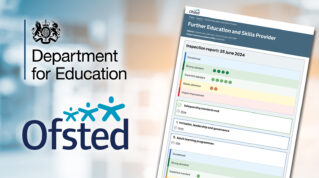Ofsted has published its first curriculum research review for further education, focusing on business.
The watchdog has published research reviews for the school curriculum since April 2021 and has now started the same work in post-16. More are expected in the coming months.
Ofsted made clear the reviews are not inspection “instruments” and inspectors do not grade subjects.
Rather, they review the quality of curriculum design, teaching and impact in a range of subjects and provision types. This enables them to “identify and evaluate systemic curricular strengths and areas for improvement in a provider”.
Today’s review says business education is “one of the largest subject areas”.
The government does not provide data just for business courses, but more than 450,000 people signed up for courses in FE in the business, administration and law sector subject area in 2022/23.
Qualifications in the sector are available from levels two to seven.
Here’s FE Week’s speed read of Ofsted’s review.
1. Maths knowledge crucial to ‘rapid progress’ in business
Ofsted stressed that solidifying maths knowledge is a crucial part of business teaching.
The regulator said “cross-cutting” concepts, which involve building core knowledge in maths before going onto business education, are required to drive “rapid progress” in the business sector.
Good business teachers “identify and teach the mathematical knowledge a learner needs” and then teach its use in business. Ofsted gives the example of teaching percentage change before using that to teach elasticity demand.
Less effective providers however say mathematical knowledge is “embedded” in their courses but not taught explicitly.
2. Learners need to be on the right course
The review shows that “most providers” in England enrol their learners on the right courses. But it does identify “a few cases” where providers put learners on level three team leader programmes because they can not offer level two business apprenticeships.
Learners may then study curriculums which are “too hard” or they “may not be in roles that give them the necessary learning opportunities”. That would risk holding back learners from completing their courses.
3. Linear progress ‘key’
Providers of business apprenticeships should “coherently plan” their curriculums so that learners can move forward to more advanced levels without having to repeat or miss any learning.
At some “weaker providers”, that does not happen though – meaning the topics covered do not always contain “more challenging theory or breadth as the levels increase”.
For instance, some level seven providers might assume that all apprentices are ready for lots of independent learning.
The regulator does acknowledge that most curriculums “ensure a smooth transition as learners progress to higher levels”. As it progresses to higher levels that would mean a “broader and more strategic focus” with an “expansion of responsibility”.
4. Courses should cover ‘business or strategic context’
Ofsted warned that courses are less effective if the “wider business or strategic context” is not applied to learning.
Good accounting courses should include a considerable variety of content covering bookkeeping, accounting, budgeting and cashflow management, for instance. As well as that, any “ambitious curriculum” should include explanations of how different management financial tools are linked.
“These providers know that it is the strategic/holistic view that helps learners to develop expertise in business education.”
5. Work and study need integration
Teaching should be married with the time spent at a workplace, Ofsted said.
Teachers who are effective “give learners plenty of opportunities to practise and build their skills” over time, to help learners at work. Using case studies, life briefs and simulations are crucial when it comes to developing learners’ skills so they can “select the right knowledge to apply in different contexts”.
By using role plays at college, teachers can develop learners’ knowledge and skills, before they are exposed to live business decision making.
The report warns that in some “weaker providers”, there are “weak links” between the on-the job and off-the job training. “In the weakest provision, the apprenticeship curriculum is viewed as a separate piece of training or study that is parallel to work but not integrated sufficiently.”
















Your thoughts